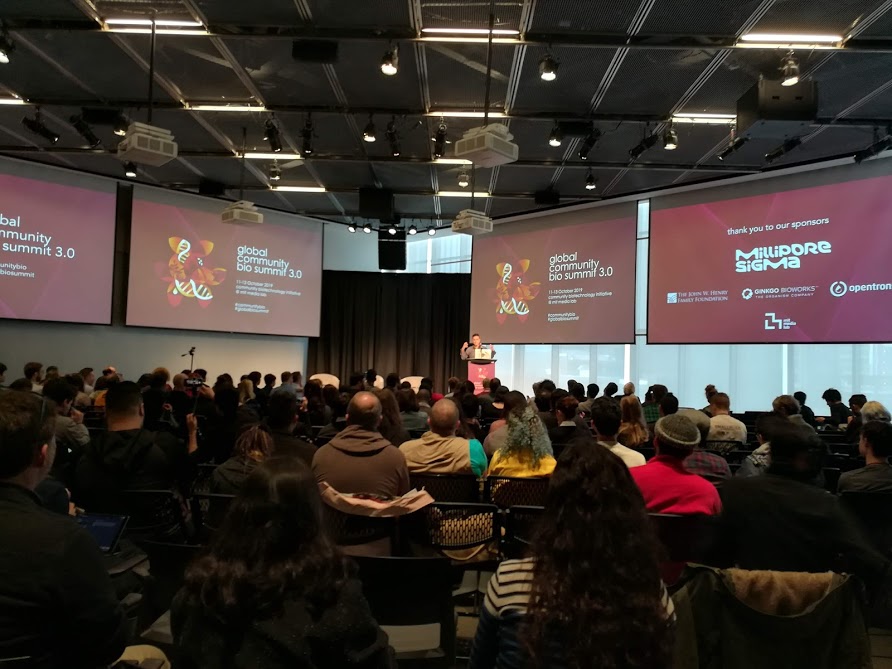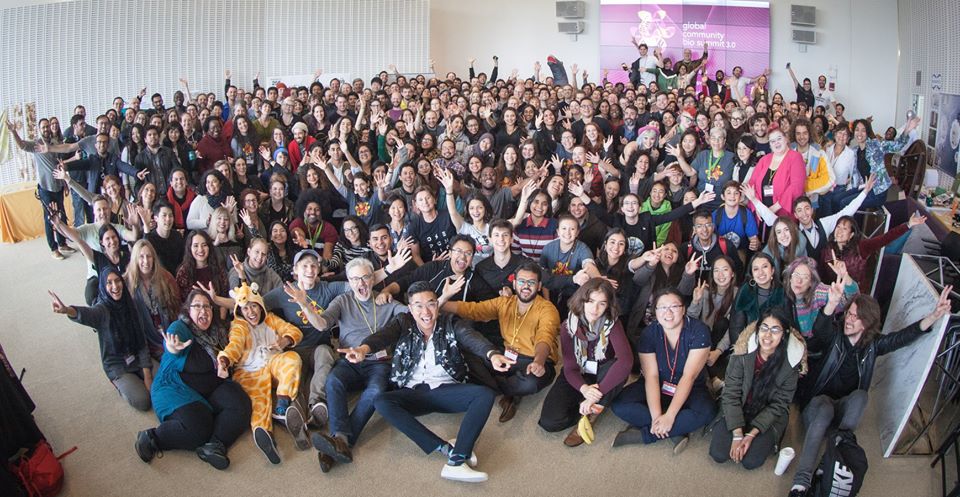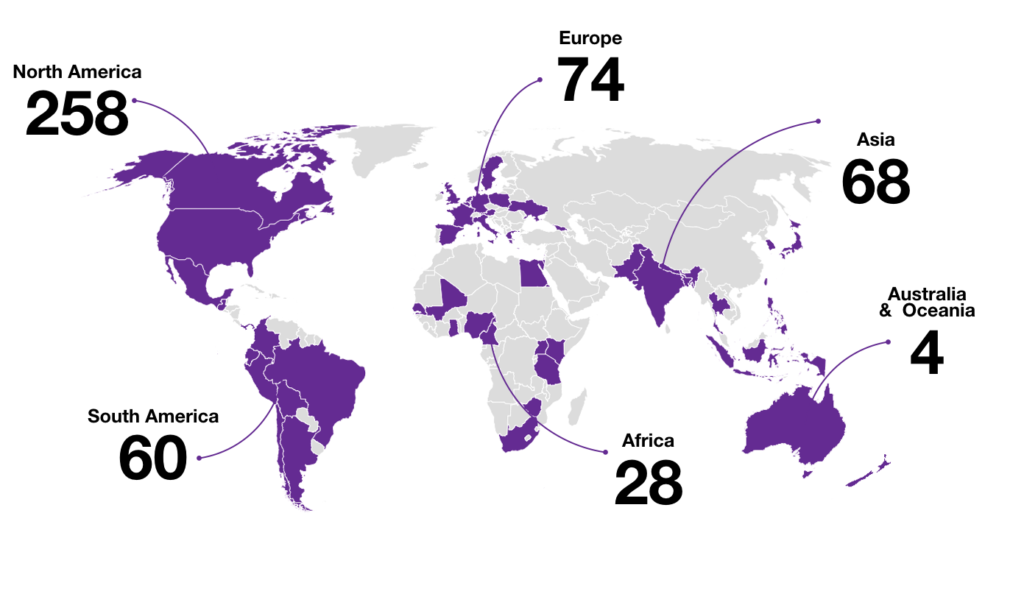The Open Bioinformatics Foundation (OBF) sponsors a Travel Fellowship program aimed at increasing diverse participation at events promoting Open Source bioinformatics software development and open science in the biological research community. Arunav Konwar’s participation at Global Community Biosummit (GCBS), 2019 was supported by this fellowship. Find more information here.

I recently had the opportunity to attend the Global Community Biosummit (GCBS), which took place between October 11-13 at the Massachusetts Institute of Technology (MIT) in Cambridge, MA, USA.
My attendance wouldn’t have been possible without the generous support of the Open Bioinformatics Foundation (OBF). I am grateful to the OBF for the travel fellowship which enabled me to undertake the journey to travel all the way from India to the city of Boston.
GCBS is a global conference that aims to initiate a discourse among people working in and around all aspects of biology and beyond. Biohackers, artists, scientists, geneticists, etc all under one roof. In its own words, it states “Our goal is to provide a space for the global community of DIY biologists / community biologists / biohackers / biomakers and members of independent and community laboratories to convene, plan, build fellowship, and continue the evolution of our movement.”
Conferences can be an incredible opportunity for people to learn from and connect with like-minded people. Below is a recount and reflections of my experiences after attending the conference, which I hope can inspire others to participate in this conference or other similar events in the future.
DAY 0
A day before the conference many participants could sign up for lab tours in and around Boston. This included visits to Gingko Bioworks’ labs, Boslab (a local community lab in Somerville), Makers’ Asylum (hacker lab in Cambridge, MA), etc. This gave participants a better idea of the overall DIY scene and ecosystem in the area that co-exists with the big-name universities.
 Cambridge, Massachusetts, USA. Photo by Arunav Konwar
Cambridge, Massachusetts, USA. Photo by Arunav Konwar
DAY 1
The conference was opened with opening remarks by David Sun Kong (Director of Community Biotechnology Initiative, MIT Media Lab), Deb Roy (Executive Director, MIT Media Lab) and Kate Darling (MIT Media Lab).
It was followed by participants introducing themselves and their projects in under 30 seconds each, in a segment called ‘Hello World’.
 David Sun Kong welcoming the attendees with his opening speech.
David Sun Kong welcoming the attendees with his opening speech.
The day consisted of plenary talks in the first half of the day followed by parallel sessions after lunch. Notable sessions were: “Global Gender Representation in Biotech / Community Bio” and “Building and Sustaining Community Labs”. There were hands-on workshops ranging from bio-sensors to full-blown introduction labs to CRISPR, all of which were extremely popular and were overbooked by the attendees. These workshops were crucial in building a deeper connection between the attendees and everyone involved.
https://www.instagram.com/p/B3hlTu-A70a/
A picture of me working on building an open-source wearable biosensor during the conference
DAY 2
Day 2 started with remarks again by David Sun Kong about the successful Day 1 and the excitement surrounding the upcoming days.
Incredible panel discussions that I attended included “Establishing and Nurturing Global Collaborations” which had the presence of researchers from around the globe, a few being Anthony DiFranco (Counter Culture Labs, Open Insulin), Jenny Molloy (University of Cambridge, Biomakespace Gathering of Open Science Hardware), etc.
Another plenary talk that I enjoyed was “Superminds: the Collective Intelligence of Community Bio” by Professor Thomas Malone of MIT Center for Collective Intelligence, where he talked about the immense potential of designing systems that can leverage the unique relationships that humans and machines can cultivate to become a kind of super-intelligent being in the future.
The rest of the day involved attending parallel tracks that participants could sign-up for and attend, and also spend time around the amazing installations of bio-art, research posters and other works around the conference space.
Day 2 of the summit ended with a party named 99Biohackers party (appropriately named after Media Lab’s weekend parties called 99Fridays).
 Scenes from the Biosummit party Day 2 at the MIT Media Lab (Photo Courtesy: David Sun Kong)
Scenes from the Biosummit party Day 2 at the MIT Media Lab (Photo Courtesy: David Sun Kong)
DAY 3
The last day intentionally started late to give people the room to recover from the previous night’s party. The day largely consisted of hands-on workshops for which people had to move to other dedicated spaces and laboratories in other MIT buildings. Unconferences (which were held in the afternoon) were a great way for people to organize smaller talks with topics of common interests.
There was a plenary meeting from 11-12 pm which involved the whole community to talk about ‘Community Ethics’. This was a great opportunity for the global community to discuss issues surrounding ethics that seem to be common across borders. It was also a great way to bring in everyone together to build a framework for a common cause.
The closing session was between 5-6 pm which brought back all the attendees to the main conference space for a final vote of thanks and reflections from the community.
 All attendee group picture GCBS 3.0
All attendee group picture GCBS 3.0
Unconferences and parallel tracks
Along with many hardware enthusiasts, the conference includes people who work on computational biology, bioinformatics, and software as well. I was able to unconference with a bunch of people working on writing and contributing to open-source software for biology and beyond. Timothy Stiles from the Boslab in Somerville, MA happened to introduce his new project Genepool to a broader crowd during the summit. More such projects were shared with the attendees by Keoni Gandall (BioBricks Foundation), Sebastian Cocioba, etc.
 Attendees came from almost every continent (except for Antarctica) Pic courtesy: Pat Pataranutaporn
Attendees came from almost every continent (except for Antarctica) Pic courtesy: Pat Pataranutaporn
Thoughts on the venue and MIT
The conference and the workshops were primarily held at the MIT Media Lab and the MIT Biology Laboratories across the street around the East campus. With its immense resources (both infrastructure and people), MIT has been able to accommodate the needs of the participants. There have been discussions on holding the event in Europe or other continents but this currently seems unlikely for the near future due to logistical reasons.
The summit, global collaborations and sister conferences
Biosummit takes pride in creating and empowering communities around the world to organize their own events. AfricaOSH is one of the conferences that grew out of the Biosummit in Africa. Darwin conference in India is another example of a major conference started by a biosummit alumni, with a stellar lineup of speakers ranging from artists like Joe Davis to biologists like Sebastian Cocioba working on incredible flower projects.
Biosummit also hosted its first group of Global Community Bio fellows. The Global Community Bio Fellows Program was started as a part of the summit and is designed to provide leadership, development training, and peer support for emerging leaders in the global community. This cohort of participants from all over the world attended online seminars organized by the MIT Media Lab and the Harvard Kennedy School and developed projects in groups over a period of a few months and finally showcased it during the summit in October.
Personal takeaways
Biosummit is an incredible, one of a kind conference that breaks the norm in terms of the ideas being discussed and the diversity of the people it brings in. It lives up to its goals of being inclusive and providing a safe space for people from every background to come and discuss ideas. I met some of the most impactful people in the DIY science and tech space and got to discuss and share recent developments.
Boston is an incredible city with an amazing ecosystem of top universities and companies working to solve some of the most pressing problems facing human civilization. I had an excellent time meeting and interacting with amazingly talented and kind people at the Global Community Biosummit and I can’t wait to attend it again next year.